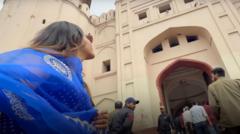Thousands of Hindu devotees in Pakistan undertake a 200-mile journey to the Hinglaj Devi temple in Balochistan, showcasing their unwavering faith and commitment to cultural identity in a predominantly Muslim nation.**
A Journey of Faith: The Hindu Pilgrimage Across Pakistan’s Desert Terrain**

A Journey of Faith: The Hindu Pilgrimage Across Pakistan’s Desert Terrain**
Amidst extreme heat, Pakistani Hindus embark on a spiritual pilgrimage to the Hinglaj Devi temple, facing adversity for cultural preservation.**
In the sweltering heat of 113 degrees Fahrenheit, thousands of Hindus in Pakistan set off on a grueling 200-mile pilgrimage to Hinglaj Devi temple, a significant site for Hindu worship. This challenging trek, which spans seven days, is both a demonstration of their spiritual devotion and an act of cultural preservation in a country where Hindus represent a minority.
One such pilgrim, Amar Faqira, made a solitary vow following his son’s unprecedented illness last year. With the child's recovery, he embraced the opportunity to fulfill his commitment and walked alongside fellow devotees traversing rugged terrains across Balochistan, a picturesque yet imposing region in southwest Pakistan.
Amar, along with his companions draped in saffron scarves and brandishing ceremonial flags, exemplifies the spirit of many participants, driven by faith and gratitude. They chant “Jai Mata Di,” a call to the Mother Goddess, while navigating extensive stretches of sun-soaked desert roads. The determination of both men and women, many bearing idols of the deity, paints a vivid picture of resilience amidst hardship.
This annual pilgrimage marks Pakistan’s largest Hindu festival, drawing thousands. Despite the challenges posed by the extreme temperature and arduous conditions, the community remains united in their purpose, demonstrating how spirituality and cultural identity transcend adversity in a diverse and sometimes contentious environment.
With their journey, the pilgrims hope for blessings beyond the physical realm, affirming their commitment to their faith and heritage.
One such pilgrim, Amar Faqira, made a solitary vow following his son’s unprecedented illness last year. With the child's recovery, he embraced the opportunity to fulfill his commitment and walked alongside fellow devotees traversing rugged terrains across Balochistan, a picturesque yet imposing region in southwest Pakistan.
Amar, along with his companions draped in saffron scarves and brandishing ceremonial flags, exemplifies the spirit of many participants, driven by faith and gratitude. They chant “Jai Mata Di,” a call to the Mother Goddess, while navigating extensive stretches of sun-soaked desert roads. The determination of both men and women, many bearing idols of the deity, paints a vivid picture of resilience amidst hardship.
This annual pilgrimage marks Pakistan’s largest Hindu festival, drawing thousands. Despite the challenges posed by the extreme temperature and arduous conditions, the community remains united in their purpose, demonstrating how spirituality and cultural identity transcend adversity in a diverse and sometimes contentious environment.
With their journey, the pilgrims hope for blessings beyond the physical realm, affirming their commitment to their faith and heritage.



















